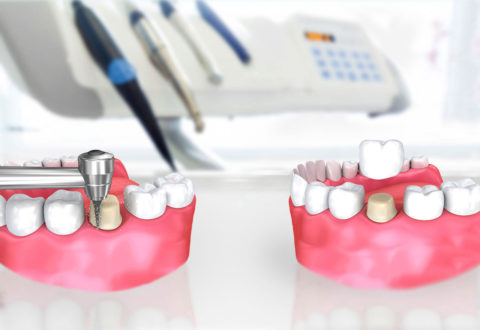
Badly damaged teeth can be restored with a crown. It is like a protective cap placed over the treated and prepared tooth so that the tooth gets back its natural shape and stability.
But there are different crowns available. As with virtually any restorative care, there are several options to choose from, using different materials and processing technology. Metal ceramic crowns – also called veneer crowns – are now considered standard care. Porcelain crowns and so-called Zirconium crowns are other alternatives.
Metal Ceramic Crowns
The metal ceramic crown is still the crown type most commonly used. It consists of a metal cap that is veneered with tooth-colored ceramic. The metal gives the crown its grip.
The design used by the dental technician involves a layer by layer ceramic veneering and ensures that the crown does not look like dentures but like a natural tooth. Natural-looking results, such as matching the color precisely with the adjacent natural teeth, places higher demands on the dental technician than any other type of crown restoration.
Advantages
- Extremely high stability/durability (more than 20 years)
Disadvantages
- Metallic edge (if the gums recede with time – this can be avoided by the dental technician also designing the edge of the crown ceramic – so-called ceramic shoulder)
- A metal ceramic crown usually requires more tooth structure removal than adhesive (glue) full ceramic restoration, especially with minimally invasive partial crowns.

Zirconium crown (Full Ceramic Crowns)
Full ceramic crowns are made entirely of porcelain. The material does not trigger allergies in contrast to metal crowns, so they do not affect your health. Also, porcelain crowns look very similar to real teeth. Therefore, doctors recommend this kind of crown for the teeth at the front, the visible region, and the molars. The porcelain mixture with Zirconium Dioxide can withstand the same pressure as metal alloys.
For patients who do not want to compromise aesthetics, the full ceramic crown is the best solution. It no longer uses metal. Both the framework and the veneer are made of high quality and stable ceramic, which has precisely the same light-conducting properties as the natural tooth structure.
The dental technician designs it so that the color, texture, and other characteristics correspond exactly to your own tooth substances.
Moreover, high-strength Zirconium oxide ceramics are available today. Though these ceramics lack the enamel-like transparency of the glass ceramics, they are particularly good because of their high strength for full ceramic crowns or bridge frameworks. They are similar to the caps from metal ceramic crowns and veneered individually.
These Crowns Have Many Advantages
- They are 100% metal-free, making it ideal for people with allergies.
- The Zirconium crown’s color can be altered to match your teeth in the mouth’s front and side regions.
- The optimal light transmission makes the crown look like a natural tooth, even in difficult lighting conditions. No black borders can be seen at the neck of the tooth or even when the gums retract
- In addition, ceramic is an excellent thermal insulator. The crowns are therefore not sensitive to temperature stimuli, e.g., ice or hot coffee.


